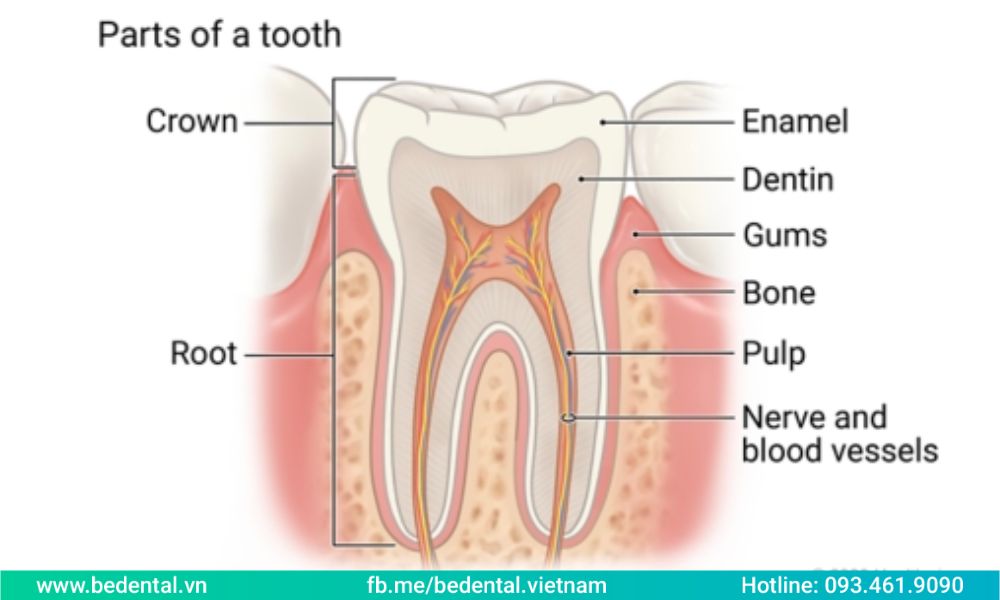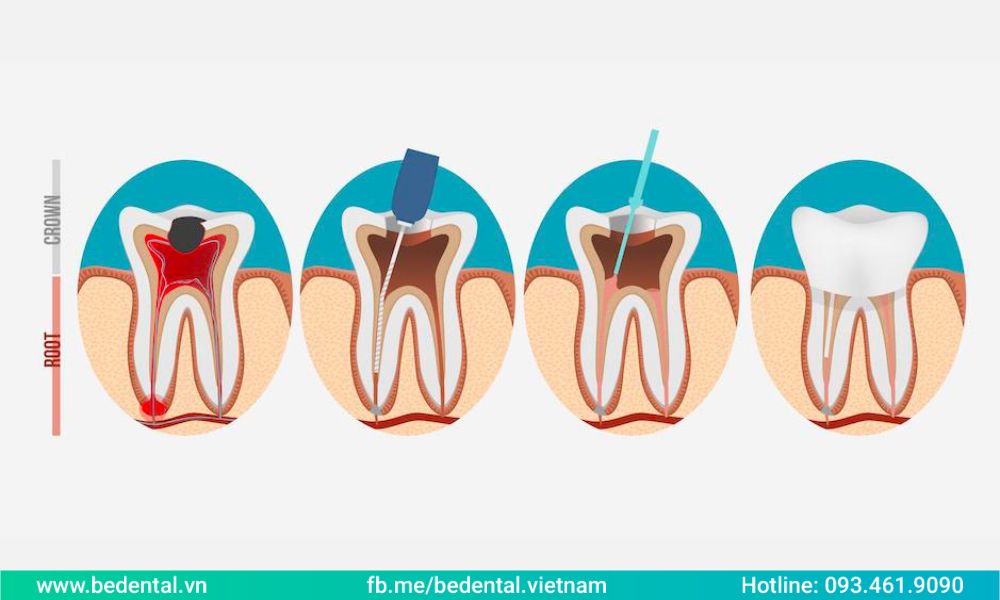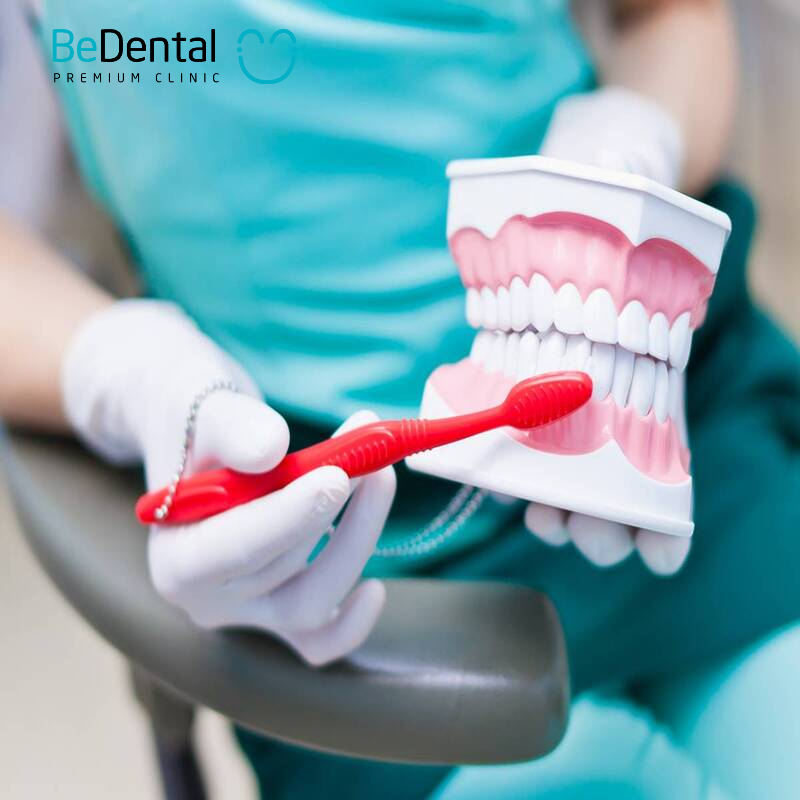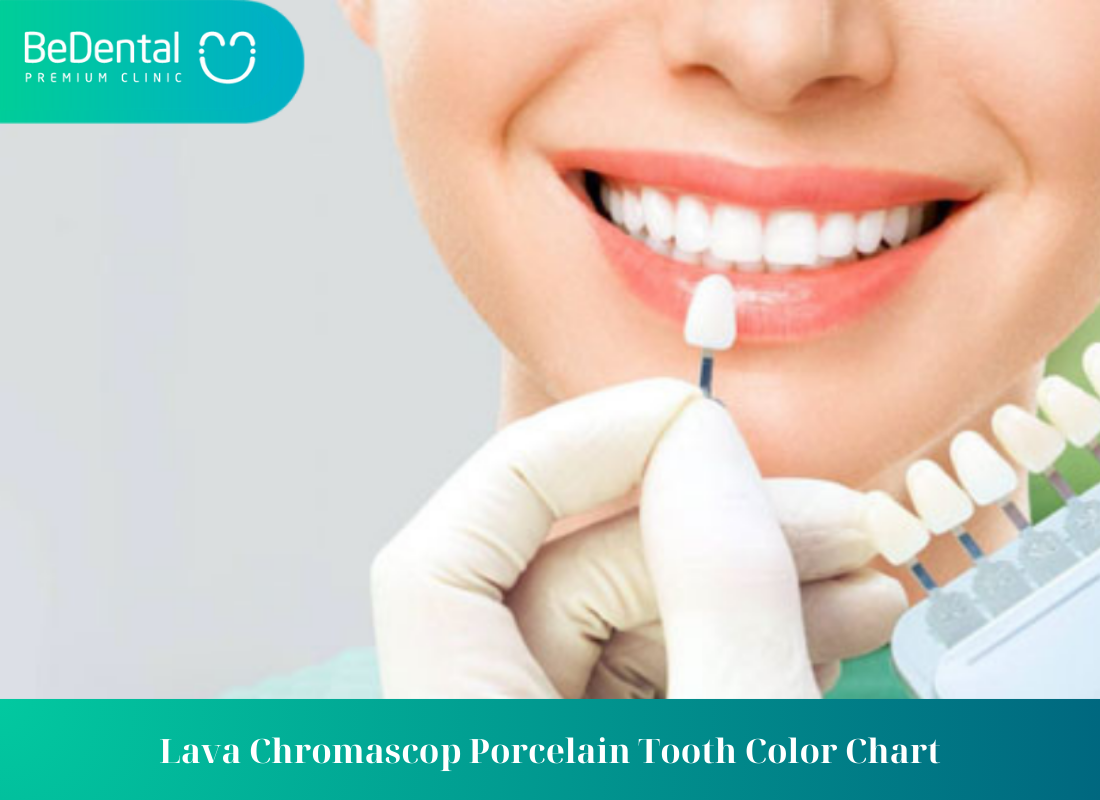When is a root canal treatment needed?
A root canal treatment (endodontics) refers to a dental process used to treat the damaged area at the center of a tooth. It involves drilling a hole into the tooth and removing infected tissue from the root canal system, known as the dental pulp (composed of tissue, nerves, and blood vessels and extends into the roots of the tooth). The root canal is filled, and the tooth is sealed with a filling or crown after the pulp is eliminated.
Root canal therapy can be performed by a dentist or a specialist endodontist.

When is a root canal treatment needed?
A root canal is needed when the pulp, which is the soft tissue inside the tooth that contains nerves, blood vessels, and connective tissue, becomes infected or inflamed. This can happen due to deep decay, repeated dental procedures on the tooth, a crack or chip in the tooth, or a traumatic injury. If the pulp is left untreated, it can lead to pain, swelling, and infection, and can eventually cause the tooth to be lost.
A root canal is a dental procedure that involves removing the infected or inflamed pulp, cleaning and shaping the inside of the tooth, and filling it with a special material to prevent further infection. Root canal therapy can save a damaged or infected tooth and prevent the need for tooth extraction.
Tooth structure
A tooth is made up of 2 parts. The crown is the surface of the tooth that can be seen with the naked eye. The root connects to the bone of the jaw, holding the tooth in its position.
The tooth also consists of:
enamel – the hard outer coating
dentine – a softer layer that places under the enamel
cementum – a hard material that covers the root’s surface
dental pulp – the soft part at the core of the tooth

Causes of tooth infection
The infected or damaged tooth may come from tooth decay, repetitive motions, cracked fillings, or gum diseases.
When the dental pulp is weakened, bacteria can start to grow and spread at the center of the tooth. This can lead to an infection or abscess, which is a pocket of pus that forms at the tooth’s root.
Symptoms
In some cases, there are no signs of the tooth abscess during the first stages. Most common symptoms include:
- Pain when biting or chewing
- Pain when eating or drinking hot or cold food and drink
- Darkening of the tooth
- Swollen and tender gums
- Pus around an infected tooth
- A swollen cheek or jaw
- A loose tooth
As the bacteria multiply and kill the pulp, these symptoms often disappear. At that time, if you leave the infected tooth in your mouth, it may get worse. So, it’s necessary to see the dentist.
It will be harder to do the root canal treatment if the infection inside your tooth becomes established.
Treatment process
First, the dentist takes an X-ray of the tooth to determine the condition of the root canals and whether there is any infection in the bone surrounding the tooth.
Before having root canal treatment, the patient will be given a local anesthetic to numb the area around the infected tooth. Then, the dentist will drill a hole into the root of the tooth to remove the bacteria. Every tooth has from 1 to 4 canals, depending on the tooth. The canals will all be cleared, shaped, and sterilized.
There are several regular check-ups for the dentist to clean and shape the hole inside. Before placing a sterile filling, the dentist will seal the tooth with a temporary filling and put a metal band around the tooth as protection.
When the treatment is done, the hole will be covered with gutta percha, a permanent substance. To reinforce the tooth, they may insert a supportive stick into the root canals.
Because the procedure of the root canal treatment takes longer than a normal filling, it may be annoying and interfering. But after root canal treatment, a tooth can last for more than 10 years.

How should I prepare for root canal treatment?
If you are scheduled to undergo root canal treatment, there are a few things you can do to prepare:
- Inform your dentist of any medications you are taking: This includes over-the-counter medications, supplements, and prescription medications. Some medications can interact with anesthetics or other medications used during the procedure.
- Eat before your appointment: You may feel more comfortable during the procedure if you have eaten a small meal beforehand. Avoid consuming caffeine or sugary drinks, as these can cause jitters or anxiety.
- Plan for transportation: You may be given a sedative to help you relax during the procedure, so it’s important to arrange for someone to drive you home afterward.
- Wear comfortable clothing: Wear loose, comfortable clothing to your appointment, and avoid wearing anything that might interfere with the procedure.
- Follow your dentist’s instructions: Your dentist may provide you with specific instructions to follow before your appointment, such as avoiding certain foods or beverages. Be sure to follow these instructions carefully.
It’s important to remember that root canal treatment is a routine procedure and your dentist will take steps to ensure your comfort throughout the process.
Recovery
It’s important to look after your teeth when recovering from root canal treatment.
During recovery time, it’s crucial to take good care of your teeth by:
- Avoid eating hard food until the treatment is finished.
- Keep your teeth clean.
- Don’t eat too much sweet and spicy food.
- Stop smoking.
- Search for ways to keep your teeth and gums healthy.
Q&A
Are root canals safe?
Yes, root canals are generally considered safe and effective dental procedures. When performed by a qualified and experienced dentist, the risks and complications associated with root canals are minimal.
Some of the common risks associated with root canal treatment include:
- Infection: If the root canal is not done properly, bacteria can enter the root canal and cause an infection.
- Pain and discomfort: Patients may experience pain and discomfort during and after the procedure, which can be managed with pain medication.
- Nerve damage: In rare cases, the nerve may be damaged during the procedure, leading to temporary or permanent numbness in the affected area.
- Fracture: The tooth may become weakened and more susceptible to fractures, especially if it is a molar.
How painful is having a root canal?
The common perception of a root canal is that it is a painful, uncomfortable, and serious operation. But it is relatively different from the truth. In fact, the treatment is painless and the best way to get rid of the discomfort and infected tooth right away.
How long do root canals last?
This study found that 86 percent of root canal treatments last 10 years and longer, 92 percent last 5 years and 98 percent last one year. Molars treated by endodontists had a much greater 10-year survival rate than those treated by conventional dentists.
What if my root canal fails?
In some cases, a root canal can fail, meaning that the treated tooth becomes infected again. If your root canal fails, your dentist may recommend a root canal retreatment or an apicoectomy.
Root canal retreatment involves reopening the tooth and removing the filling material and infected tissue. The canals are then cleaned, reshaped, and filled again with new material.
Can I eat after a root canal?
Yes, you can eat after a root canal procedure. However, you should wait until the anesthesia wears off completely to avoid accidentally biting your tongue or cheek. It is also recommended to avoid eating hard, crunchy, or sticky foods on the treated tooth for the first few days as it may cause discomfort or damage to the temporary filling or crown.
Is it painful after root canal treatment?
Mild discomfort might follow a successful root canal for a few days. This is temporary, and should go away on its own as long as you practice good oral hygiene. After three days, if the soreness is still there, schedule a follow-up visit with your dentist.
Should I get a root canal or extraction?
Root canal treatment is preferable than extraction when treating an infected tooth. There are, however, certain exceptions, such as when the tooth has significant damage. Before making a recommendation, your dentist will perform a comprehensive evaluation of your oral health.
Is a root canal a serious procedure?
Although a root canal, sometimes referred to as an endodontic procedure, is a risky surgical procedure, doctors perform them often.
What is the alternative to a root canal?
Alternatives to root canal therapy in dentistry include direct pulp capping, pulpotomy, pulpectomy, endodontic surgery, retreatment, tooth extraction, dental implants, bridges, or dentures.
Be Dental Service Price List
| Danh mục | Unit | Giá thành | |
|---|---|---|---|
| 1.Teeth filling (More detail...) | |||
| Baby teeth filling | 1 Unit | 250.000 ~ 10$ |
|
| Permanent Teeth Filling | 1 Unit | 500.000 ~ 20$ |
|
Cosmetic Filling | 1 Unit | 700.000 ~ 28$ |
|
Sensitive teeth filling | 1 Unit | 500.000 ~ 20$ |
|
| Composite bonding | 1 Unit | 1.000.000 ~ 40$ |
|
| 2.Root Canal Treatment - Anterior by endodontist machine (More detail...) | |||
| Root Canal Treatment - Anterior for baby teeth | 1 Unit | 800.000 ~ 31$ |
|
| Root Canal Treatment - Anterior for Front teeth | 1 Unit | 1.200.000 ~ 47$ |
|
| Root Canal Treatment - Anterior for Premolar teeth | 1 Unit | 1.500.000 ~ 59$ |
|
| Root Canal Treatment - Anterior for molar teeth | 1 Unit | 2.000.000 ~ 79$ |
|
| 3.Root Canal reTreatment - Anterior by endodontist machine | |||
| Root Canal Treatment - Anterior for Front teeth by endodontist machine | 1 Unit | 1.500.000 ~ 59$ |
|
| Anterior for Premolar teeth by endodontist machine | 1 Unit | 1.800.000 ~ 71$ |
|
| Anterior for molar teeth by endodontist machine | 1 Unit | 2.300.000 ~ 90$ |
|
| 4 Vecniflour dental care (More detail...) | |||
| Vecniflour dental care for child | 1 Unit | 500.000 ~ 20$ |
More
Toothache and 6 common symptoms
Tooth decay and 11 risk factors
Tartar and 6 ways to prevent its return
Tư vấn chuyên môn bài viết:
BÁC SĨ DƯƠNG THỊ THÙY NGA




